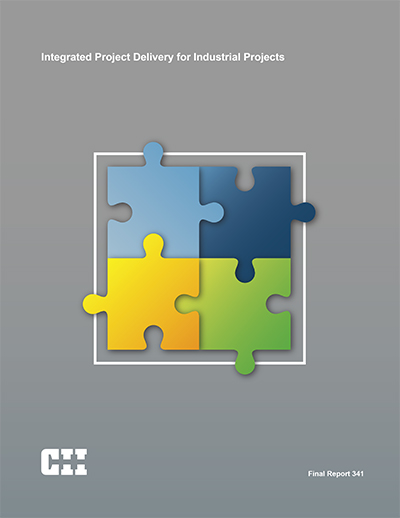
Integrated Project Delivery for Industrial Projects
Industrial capital projects are risky business ventures. As they increase in size, uncertainty, and complexity, they frequently experience corresponding growth in cost and time to deliver, and they often fail to achieve their desired performance results. According to Merrow, “65% of all industrial projects fail to meet business objectives” (Merrow 2011).
The risk-shedding structure of current project delivery methods not only creates a non-collaborative environment that impedes the performance of industrial projects; risk-shedding can also stifle innovation and create inefficiencies during industrial project delivery processes. For decades, the delivery of industrial capital projects has suffered from stunted productivity growth and little broad industry innovation while seeing an increase in claims and disputes. Traditional project delivery has not proven to be reliable for industrial capital projects. The industry is open to alternatives.
Integrated Project Delivery (IPD) was introduced in the healthcare facilities industry in the United States. Alliance Contracting (or “Alliancing”) first appeared on public infrastructure projects in Australia and New Zealand. These two approaches have proven to effectively use enhanced collaboration and integration strategies and methods to bring greater value for investment to the projects where they are employed. If the principles of IPD and Alliancing could be used to deliver industrial projects, perhaps they would allow more active collaboration among participants and create higher levels of integration of project stakeholders. If these principles enjoyed the success they have already realized in healthcare and infrastructure projects, they could reduce the probability of failed industrial projects and create a better environment for innovation and efficiency, leading to the more efficient use of available resources in the capital project delivery industry.
The Construction Industry Institute (CII) challenged Research Team 341 (RT-341) to evaluate the potential of increasing integration and collaboration by applying the principles of IPD and Alliancing in the industrial capital projects sector. The results of its industry-wide survey, structured data analysis, and case studies indicated to RT-341 that industrial projects can benefit from implementing IPD and Alliancing strategies. In fact, nearly all (98%) survey participants responded that increasing collaboration and integration increases overall project value for the money on industrial projects. Thus, RT-341 reached the following conclusion:
The increased integration and collaboration that come from implementing IPD and Alliancing principles can lead to better project performance and increase the probability of successfully achieving the business case objectives of an industrial project.
The research findings suggest that industrial project performance is improved by increased collaboration and integration, demonstrating that industrial projects are good candidates for Integrated Project Delivery. RT-341’s findings build on previous CII research to provide guidance for effectively structuring project delivery with the right balance of IPD and Alliancing’s collaboration and integration principles to enhance industrial project performance and achieve important business objectives. The Industrial Integrated Project Delivery (I2PD) framework developed by RT-341 applies defined principles and implementation methods to deploy Integrated Project Delivery on industrial projects.
The I2PD Guidebook reports potential barriers to implementation of I2PD and proposes possible solutions to each barrier on an industrial project. It provides guidance on key principles and methods of I2PD to structure and deliver an industrial project with collaboration and integration. The guide describes methods to implement I2PD with process workflow and reports on potential barriers to implement these on industrial projects with potential solutions.
The I2PD contract templates will be based on a real I2PD project and will include key contractual clauses incorporating the key collaboration and integration principles to create a framework for integrated project delivery on an industrial project. The template can serve as a benchmark for future I2PD projects.


